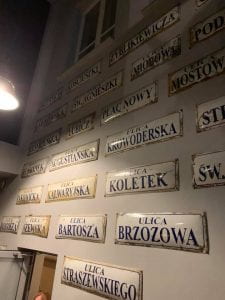As we have traveled across Europe, it has been clear that the national memory of the war is very different in each country. True, everyone highlights the victories and brush defeats under the rug. But after finishing our time in Poland, I was intrigued with the way that they have presented their collective memory of the war, especially when compared to what we were seeing in France.
On our visit to the Schindler Museum we had a fantastic tour guide. She was very knowledgeable and tried to give us the fullest picture possible of life in Krakow and around Poland during the occupation during the war. While the museum is located in the former Schindler factory, it is not simply a shrine to Oskar Schindler. They have taken the space and turned it into a very interesting museum that displays how Krakow evolved before, during, and after the war.
Similarly to what we saw in France, there was a big emphasis on the Polish identity topping all other religious or social identity. Our tour guide explained that while there Jews in Krakow, they were Polish first, just as a French Jew was French first and Jewish second. One of the striking similarities was also how both countries are manipulating the narratives of the war to remove any national blame. In France everyone was a resister. In Poland there were good and bad people on both sides, and the death of the Jews was the sole responsibility of the Nazis. In Poland it is actually illegal to claim that the Poles had anything to do with the Holocaust. While it is not that extreme in France, the sentiment is still there.
There were also some differences that I noticed between the countries. Something that kept coming back to me was the exhibit in Caen that claimed France would be victorious “with or without the Allies.” In Poland there did not seem to be this claim of self-liberation. Our tour guide pointed out that Poland never signed an armistice, they just lost the fight. She also brought up how Poland needed the help of the Allies because their army was too weak to defeat the German forces. While other parts of the museum may have downplayed the conquest of Poland, I appreciated the mild honesty that came when she explained that Poland would not be able to stand alone.
Poland and France are very different countries, and the war is significant for different reasons. I don’t know what I expected when I came to Poland, but I was surprised to see how their national narrative, while still flawed, was comparable to the French. I think that it will be interesting as we travel to Germany to think about how the national memory can be shaped and redefined based on who is telling it and where it is being told.


